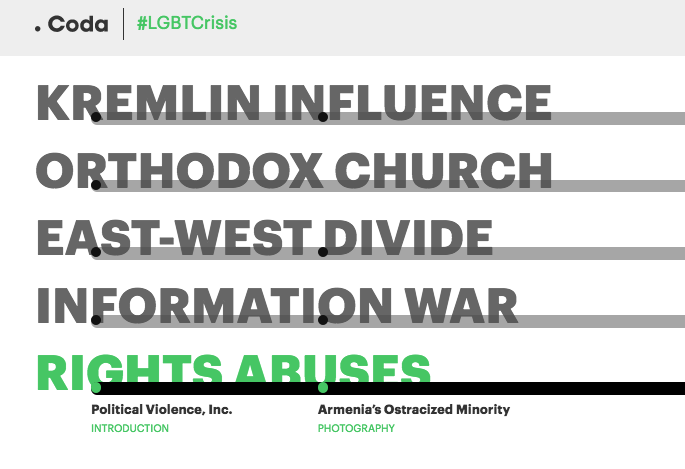
The Coda Story homepage is a busy place — filled to the corners, literally, with stories exploring different facets of Russia’s war on LGBTQ rights. There’s a video profile of a transgender woman living in Georgia. There’s a collection of intimate portraits of the LGBTQ community in Armenia’s capital city. There’s an overview of the Kremlin’s public stance on gay rights.
Coda Story is a “single-issue web platform,” as its team describes it, and it was built to capture all the geopolitical and economic undercurrents that contribute to the bubbling-over of a conflict: to “stay on the story” after the news cycle has largely moved on. At the moment, the nonprofit is in the first month of a three-month pilot to cover LGBTQ rights in Russia as thoroughly and continuously as possible. Readers can view pieces such as the video of the transgender woman within the context of overarching themes. These main themes are displayed as “Currents,” a framework designed to help readers visualize trend lines as stories are published to the site.

“We wanted to test the process of running a full Coda deployment — of being live online, updating the stories, commissioning stories, and so on,” said Natalia Antelava, Coda Story co-founder and a long-time correspondent for the BBC. “A big reason we picked the topic of gay rights in Russia is that we felt it would play into the strength of Coda’s editorial approach, where you take a very narrow focus but use that as a window into much bigger issues.”
This editorial approach has been incubating for quite some time: In collaboration with user-experience design firm Method (which offered its services free), the Coda team developed the “Currents” tool as well as a specific visual identity to win “best news startup” at the Global Editors Network summit in the summer of 2014. The online platform itself, called Codex Press, was created by web developer Tim Farnam, a former Washington Post staff writer.
Coda launched a crowdfunding campaign in December to match a foundation grant it had received, and ended up raising an additional $23,000 from 191 backers. Most of the funders were from the U.S., some were from continental Europe, and a smaller number from Russia, Ukraine, Georgia, and other countries from the former Soviet Union.
In the case of LGBTQ rights in Russia, Antelava hopes the stories will attract two different sets of readers.
“This pilot is definitely something that will be of interest to the LGBTQ community around the world,” she said. “But we want to make it just as interesting for anyone who wants to understand this part of the world, or wants to understand Putin, or wants to understand what’s happening in Eastern Ukraine. It’s a niche audience, but in this case, we’ve covered potentially two niches.”
This echoes the line of thinking espoused by Lara Setrakian, founder and executive editor of the single-subject “Deeply” sites (Syria Deeply, Ebola Deeply, Water Deeply, Arctic Deeply).
“We should be covering species-level issues,” Setrakian told me recently. “If it’s a species-level issue, and we’re not seeing it adequately covered in the news cycle, that makes it a candidate … The most important thing is choosing one and focusing on execution until we find that it’s reached an adequate level of development.”
Coda’s mission is to “stay on the story” after mainstream media leaves a crisis region, but how will it convince readers to come back to the issues it’s so painstakingly covering?
“We’re not in the business of flogging dead horses. We pick crises that are consequential and complex, and that can’t be understood through sporadic flashes of attention,” Abigail Fielding-Smith, Coda Story’s chief content officer, said. “It’s less about persuading the readers to keep following a particular topic for a length of time, and more about making sure we keep bringing them stuff that is as interesting as the crisis is. The more invested you are in something, the more interesting it is.”The site features pieces written by the small Coda Story team, as well as contributions from freelancers and other journalists. It has an editorial partnership and content exchange with news and analysis site EurasiaNet and can tap into that site’s large network of writers on the ground.
Still, with a limited staff, the site won’t be trying to keep up with breaking news.
“The idea is to watch things unfurl at the pace of evolving trends rather than daily developments,” Fielding-Smith said. “But, of course, timeliness is key to impact. Our social media people are monitoring news developments and using them as pegs to push our content with. And we’ll be hopefully anticipating developments, doing reporting that complements the news cycle.”
Antelava stresses this is still just a pilot. “We are constantly talking to people about story ideas or what can be done differently, where we can contribute a perspective or a new angle or maybe have a bit of a scoop.”
In the short term, the team will continue to rely on the initial burst of foundation and crowdfunding money; the editorial commitment is three months. In the long run, though, Coda Story will explore other revenue streams, including licensing its editorial methods to other groups looking to cover a specific issue.